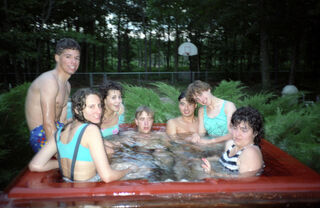Sex
Can a Hookup Ever Lead to a Relationship?
Research reveals which pairings are most likely to keep meeting up.
Posted November 25, 2021 Reviewed by Vanessa Lancaster
Key points
- Future hookups are highly desirable if past hookups with the person were pleasurable and if the individual was known before the hookup.
- Research shows that alcohol and drugs were not uncommon companions in hookup dyads.
- Male-male dyadic pairs were somewhat unique in being more likely to be one-time events and to include giving and receiving oral sex.
- Female-female dyadic pairs were the least likely to regret their decision to hookup.

Using a social life survey with over ten thousand young adults, two researchers challenged the commonly accepted assumption that ubiquitous hookups on college campuses among young adults have made romantic relationships obsolete.
By contrast, their view is that “many college students see hookups as a pathway to relationships.” Is this true for straight youths but not for queer youths? It makes sense that those who have a great hookup experience will want to pursue more hookup encounters in the future—but do they? Will hookups lead to finding romance?
Although sociologists Heather Hensman Kettrey and Aubrey Johnson explored these questions, whether the romantic intentions and the dreamy hopes were fulfilled were not addressed—but should be documented in future research. Nevertheless, this omission did not restrain the two researchers from suggesting that college educational and mental health professionals should encourage hookups as a positive development.
One particular goal of the research was to explore whether whatever pattern is found for heterosexual hookups also characterizes same-sex hookups and relationships. Citing previous research, the two sociologists noted, “In a heteronormative social environment, same-sex markets will be pushed underground, and individuals will seek partners in private or obscure settings.”
These “obscure” venues often include infamous online hookup apps, some of which advertise themselves as opportunities for instant sex or to attend sex clubs and sex parties (especially in urban areas). Other apps are “dating” focused—though some sexual minorities doubt that users sincerely attempt to find a romantic rather than a sexual partner.
The survey was administered on 22 college campuses with a nearly 100 percent response rate. Most had consumed alcohol prior to their hookup experiences. Slightly less than half had never hooked up, and about one-fifth had repeat performances with the same person more than ten times.
Men who hooked-up with men formed a unique dyad in several ways: they were the most likely to have a one-time experience with another man; the least likely to “not at all” know his partner prior to the hookup; the least likely to substitute drugs for alcohol before and during the hookup; and the most likely to perform and receive oral sex.
Women who engaged other women in sex were most likely to report that they “very much” enjoyed the hookup experience and were the least likely to regret hooking up (eight percent).
Regardless of gender or sexuality, the most frequent response to hookups was “interest in a subsequent hookup” and “interest in a relationship with hookup partners.” If they were familiar with their partner and enjoyed the experience, they were more likely to express interest in further hookups with that partner with the potential, many hoped, of developing a romantic relationship. This was slightly truer for women than men. Again, the survey did not assess whether the hookups actually evolved into a romance.
The researchers suggested that their findings point toward policies that colleges might want to implement:
- Hookups should be viewed as “meaningful interactions rather than fleeting sexual events” for both other-sex and same-sex couples.
- Same-sex dyads should not be construed as merely experimental.
- Higher education professionals should foster a climate where “women’s sexual satisfaction is promoted equally with men’s sexual satisfaction.”
- Hookup cultures should not be negatively judged or students shamed for engaging in hookups.
- Rather than portray hookups as primarily risky, they should be presented as opportunities for pleasure with the potential to evolve into romantic possibilities.
In my interviews with young adults, I have been impressed with the hope that a hookup will become a romantic relationship. For many, the hookup was a “trying out” experience that might lead to romance, but if it did not, they at least had a good time—to varying degrees. This appeared to be true for individuals across the sexual spectrum, from totally straight to gay.
Facebook image: Jacob Lund/Shutterstock
References
Kettrey, H.H., & Johnson, A.D. (2021). Hooking up and pairing off: Correlates of college students’ interest in subsequent hookups and romantic relationships with other-sex and same-sex hookup partners. Journal of Sex Research, 58, 915–942. doi:10.1080/00224499.2020.1766403


